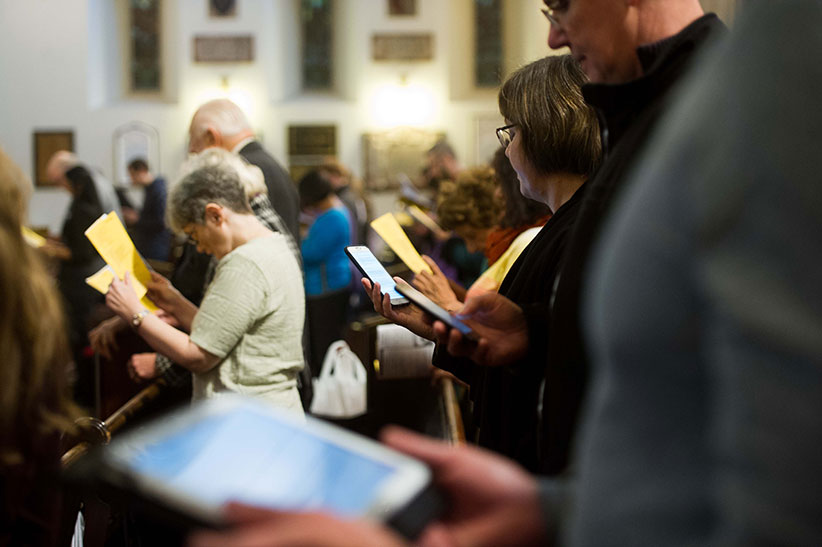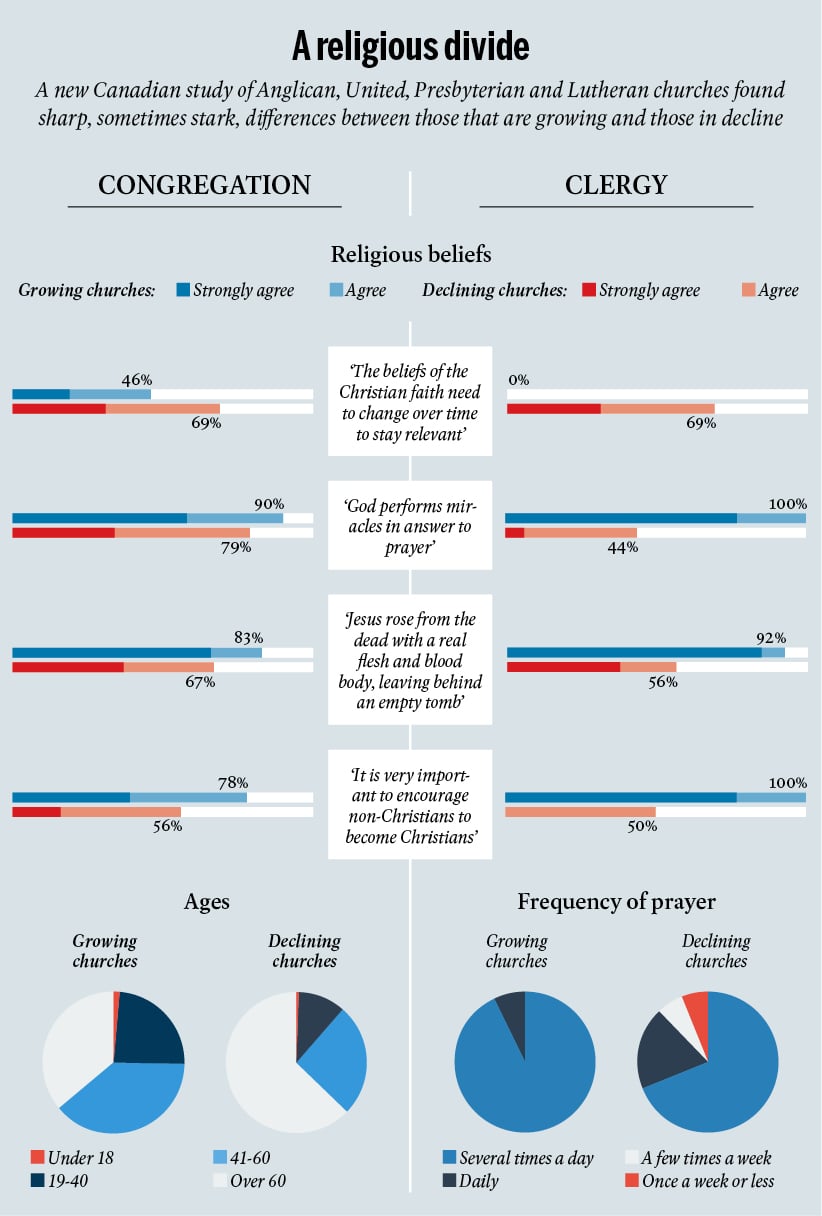Nine interesting data points on the state of today’s Protestant churches
A closer look at the data girding a major new peer-reviewed study about the nature of successful—and failing—churches
St. Pauls Anglican church on Bloor street in Toronto, Ontario encourages the use of modern luxuries and technolgies during congregations. The church considers itself very progressive in a traditional setting. (Photograph by Cole Garside)
Share

Overall, church attendance in mainline Protestant denominations is falling. Buildings are being closed, with some being converted into condominiums and private homes. But some individual churches are growing, often by leaps and bounds. Why?
The long disputed question of just what role adherence to core Christian orthodoxy plays in a church’s numerical success—that is, whether it is growing or declining—has received a compelling and convincing answer in a major new peer-reviewed study—the Mainline Church Growth Study—by two Canadian academics, Wilfrid Laurier University sociologist David Haskell and Kevin Flatt, professor of church history at Hamilton’s Redeemer University College. They gave detailed questionnaires to both clergy and congregations of mainline Protestant churches (Anglican, United, Presbyterian and Evangelical Lutheran) in southern Ontario and looked at data from 2003-13.
The answers reveal a sharp divide: growing churches believe far more strongly than declining ones in traditional Christian orthodoxy—basic articles of faith (the ancient Creeds), the authority of Scripture, God’s visible working in the world today, the exclusivity of Christianity (Jesus as the door to eternal life), and the importance of daily prayer.
In a Canadian exclusive, Haskell and Flatt have shared their findings with Maclean’s. In addition to the study’s key results found in this story, here are nine things that stood out among the answers given by congregants and clergy that are growing or shrinking—all rather relevant for a religion of revelations.
Frequency of prayer
Growing church congregations
- Daily: 45%
- Several times a week: 23%
- Once a week: 16%
- Several times a month: 3%
- Once a month: 5%
- Less than once a month: 6%
Declining church congregations
- Daily: 29%
- Several times a week: 28%
- Once a week: 18%
- Several times a month: 7%
- Once a month: 6%
- Less than once a month: 8%
Growing church clergy
- Several times a day: 93%
- Daily: 7%
Declining church clergy
- Several times a day: 69%
- Daily: 19%
- Few times a week: 6%
- Once a week or less: 6%
Frequency in reading the Bible
Growing church congregations
- Daily: 18%
- Several times a week: 18%
- Once a week: 10%
- Several times a month: 9%
- Once a month: 6%
- Less than once a month: 35%
Declining church congregations
- Daily: 10%
- Several times a week: 8%
- Once a week: 7.5%
- Several times a month: 7.5%
- Once a month: 5%
- Less than once a month: 56%
Growing church clergy
- Daily: 71%
- Several times a week: 29%
Declining church clergy
- Daily: 19%
- Several times a times: 56%
- Once a week: 6%
- Several times a month or less: 19%
Agree or disagree: ‘‘Through the life, death and resurrection of Jesus, God provided a way for the forgiveness of my sin.”
Among growing church congregations:
- Strongly disagree: 2%
- Moderately disagree: 1.7%
- Moderately agree: 14.6%
- Strongly agree: 79%
Among declining church congregations:
- Strongly disagree: 4.2%
- Moderately disagree: 4.5%
- Moderately agree: 28.8%
- Strongly agree: 56.6%
Among growing church clergy:
- Strongly disagree: 0%
- Moderately disagree: 0%
- Moderately agree: 15.4%
- Strongly agree: 84.6%
Among declining church clergy:
- Strongly disagree: 6.25%
- Moderately disagree: 6.25%
- Moderately agree: 31.25%
- Strongly agree: 56.25%
Agree or disagree: “Only those who believe in and follow Jesus Christ will receive eternal life.”
Among growing church congregations:
- Strongly disagree: 15.7%
- Moderately disagree: 19%
- Moderately agree: 19.6%
- Strongly agree: 40.1%
Among declining church congregations:
- Strongly disagree: 32.3%
- Moderately disagree: 25.4%
- Moderately agree: 2.4%
- Strongly agree: 12.8%
Among growing church clergy:
- Strongly disagree: 7.7%
- Moderately disagree: 7.7%
- Moderately agree: 30.8%
- Strongly agree: 46.2%
Among declining church clergy:
- Strongly disagree: 43.75%
- Moderately disagree: 43.75%
- Moderately agree: 6.25%
- Strongly agree: 0%
Agree or disagree: “Believing Christians have access to real, supernatural power in this life that is not available to non- believers.’’
Among growing church congregations:
- Strongly disagree: 5%
- Moderately disagree: 6.7%
- Moderately agree: 17.1%
- Strongly agree: 65.9%
Among declining church congregations:
- Strongly disagree: 11.5%
- Moderately disagree: 11.9%
- Moderately agree: 30%
- Strongly agree: 37.4%
Among growing church clergy:
- Strongly disagree: 0%
- Moderately disagree: 23.1%
- Moderately agree: 38.5%
- Strongly agree: 38.5%
Among declining church clergy:
- Strongly disagree: 62.5%
- Moderately disagree: 18.75%
- Moderately agree: 18.75%
- Strongly agree: 0%

Asked only of clergy, agree or disagree: “Jesus was not the divine Son of God.’’
Among growing church clergy:
- Strongly disagree: 100%
Among declining church clergy:
- Strongly disagree: 68.75%
- Moderately disagree: 18.75%
- Moderately agree: 6.25%
- Strongly agree: 6.25%
Asked only of congregations, agree or disagree: “I have committed my life to Christ”
Among growing church congregations:
- Strongly disagree: 2.3%
- Moderately disagree: 4.6%
- Moderately agree: 31.2%
- Strongly agree: 59.1%
Among declining church congregations:
- Strongly disagree: 3.1%
- Moderately disagree: 7.6%
- Moderately agree: 47.8%
- Strongly agree: 36%
Asked only of congregations, agree or disagree: “The Bible is the product of human thinking about God, so some of its teachings are wrong or misguided.”
Among growing church congregations:
- Strongly disagree: 46.6%
- Moderately disagree: 19.2%
- Moderately agree: 23.3%
- Strongly agree: 6.9%
Among declining church congregations:
- Strongly disagree: 16.2%
- Moderately disagree: 19%
- Moderately agree: 40.9%
- Strongly agree: 15.2%
Asked only of clergy, agree or disagree: “The Bible is the word of God and is reliable and trustworthy.”
Among growing church clergy:
- Strongly disagree: 0%
- Moderately disagree: 0%
- Moderately agree: 7.7%
- Strongly agree: 92.3%
Among declining church clergy:
- Strongly disagree: 6.25%
- Moderately disagree: 37.5%
- Moderately agree: 12.5%
- Strongly agree: 43.75%
SOURCE: D. Millard Haskell, Kevin N. Flatt, Stephanie Burgoyne, Mainline Church Growth Study (2016)